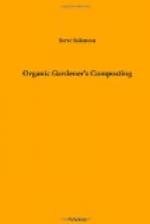Just as with farm animals, human health also responds to soil fertility. Industrial agriculture steadily lowered the average nutritional quality of food and gradually increased human degeneration, but these effects were masked by a statistical increase in human life span due to improved public sanitation, vaccinations, and, starting in the 1930s, the first antibiotics. As statistics, we were living longer but as individuals, we were feeling poorer. Actually, most of the statistical increase in lifespan is from children that are now surviving childhood diseases. I contend that people who made it to seven years old a century ago had a chance more-or-less equal to ours, of surviving past seventy with a greater probability of feeling good in middle-and old age. People have short memories and tend to think that things always were as they are in the present. Slow but continuous increases in nutritionally related diseases like tooth decay, periodontal disease, diabetes, heart disease, birth defects, mental retardation, drug addiction or cancer are not generally seen as a “new” problem, while subtle reductions in the feeling of well-being go unnoticed.
During the 1930s a number of far-seeing individuals began to worry about the social liabilities from chemically dependent farming. Drs. Robert McCarrison and Weston Price addressed their concerns to other health professionals. Rudolf Steiner, observing that declines in human health were preventing his disciples from achieving spiritual betterment started the gentle biodynamic farming movement. Steiner’s principal English speaking followers, Pfeiffer and Koepf, wrote about biological farming and gardening extensively and well.
Professor William Albrecht, Chairman of the Soil Department of the University of Missouri, tried to help farmers raise healthier livestock and made unemotional but very explicit connections between soil fertility, animal, and human health. Any serious gardener or person interested in health and preventive medicine will find the books of all these unique individuals well worth reading.
I doubt that the writings and lectures of any of the above individuals would have sparked a bitter controversy like the intensely ideological struggle that developed between the organic gardening and farming movement and the agribusiness establishment. This was the doing of two energetic and highly puritanical men: Sir Albert Howard and his American disciple, J.I. Rodale.
Howard’s criticism was correctly based on observations of improved animal and human health as a result of using compost to build soil fertility. Probably concluding that the average farmer’s weak ethical condition would be unable to resist the apparently profitable allures of chemicals unless their moral sense was outraged, Howard undertook an almost religious crusade against the evils of chemical fertilizers. Notice the powerful emotional loading carried in this brief excerpt from Howard’s Soil and Health:




